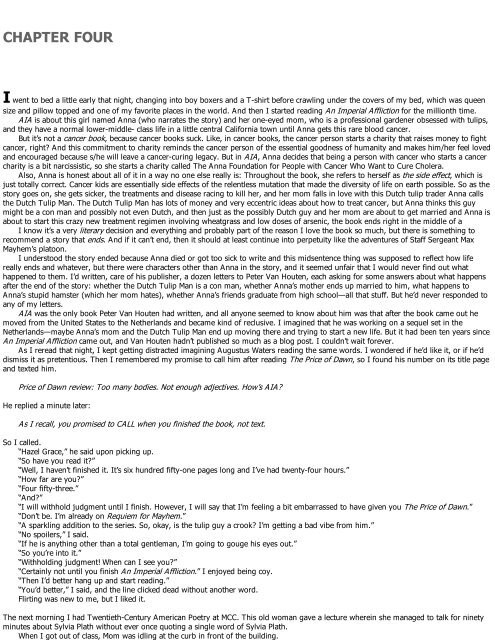You also want an ePaper? Increase the reach of your titles
YUMPU automatically turns print PDFs into web optimized ePapers that Google loves.
The next morning I had Twentieth-Century American Poetry at MCC. This old woman gave a lecture wherein she managed to talk for ninety<br />
minutes about Sylvia Plath without ever once quoting a single word of Sylvia Plath.<br />
When I got out of class, Mom was idling at the curb in front of the building.<br />
CHAPTER FOUR<br />
I went to bed a little early that night, changing into boy boxers and a T-shirt before crawling under the covers of my bed, which was queen<br />
size and pillow topped and one of my favorite places in the world. And then I started reading An Imperial Affliction for the millionth time.<br />
AIA is about this girl named Anna (who narrates the story) and her one-eyed mom, who is a professional gardener obsessed with tulips,<br />
and they have a normal lower-middle- class life in a little central California town until Anna gets this rare blood cancer.<br />
But it’s not a cancer book, because cancer books suck. Like, in cancer books, the cancer person starts a charity that raises money to fight<br />
cancer, right? And this commitment to charity reminds the cancer person of the essential goodness of humanity and makes him/her feel loved<br />
and encouraged because s/he will leave a cancer-curing legacy. But in AIA, Anna decides that being a person with cancer who starts a cancer<br />
charity is a bit narcissistic, so she starts a charity called The Anna Foundation for People with Cancer Who Want to Cure Cholera.<br />
Also, Anna is honest about all of it in a way no one else really is: Throughout the book, she refers to herself as the side effect, which is<br />
just totally correct. Cancer kids are essentially side effects of the relentless mutation that made the diversity of life on earth possible. So as the<br />
story goes on, she gets sicker, the treatments and disease racing to kill her, and her mom falls in love with this Dutch tulip trader Anna calls<br />
the Dutch Tulip Man. The Dutch Tulip Man has lots of money and very eccentric ideas about how to treat cancer, but Anna thinks this guy<br />
might be a con man and possibly not even Dutch, and then just as the possibly Dutch guy and her mom are about to get married and Anna is<br />
about to start this crazy new treatment regimen involving wheatgrass and low doses of arsenic, the book ends right in the middle of a<br />
I know it’s a very literary decision and everything and probably part of the reason I love the book so much, but there is something to<br />
recommend a story that ends. And if it can’t end, then it should at least continue into perpetuity like the adventures of Staff Sergeant Max<br />
Mayhem’s platoon.<br />
I understood the story ended because Anna died or got too sick to write and this midsentence thing was supposed to reflect how life<br />
really ends and whatever, but there were characters other than Anna in the story, and it seemed unfair that I would never find out what<br />
happened to them. I’d written, care of his publisher, a dozen letters to Peter Van Houten, each asking for some answers about what happens<br />
after the end of the story: whether the Dutch Tulip Man is a con man, whether Anna’s mother ends up married to him, what happens to<br />
Anna’s stupid hamster (which her mom hates), whether Anna’s friends graduate from high school—all that stuff. But he’d never responded to<br />
any of my letters.<br />
AIA was the only book Peter Van Houten had written, and all anyone seemed to know about him was that after the book came out he<br />
moved from the United States to the Netherlands and became kind of reclusive. I imagined that he was working on a sequel set in the<br />
Netherlands—maybe Anna’s mom and the Dutch Tulip Man end up moving there and trying to start a new life. But it had been ten years since<br />
An Imperial Affliction came out, and Van Houten hadn’t published so much as a blog post. I couldn’t wait forever.<br />
As I reread that night, I kept getting distracted imagining Augustus Waters reading the same words. I wondered if he’d like it, or if he’d<br />
dismiss it as pretentious. Then I remembered my promise to call him after reading The Price of Dawn, so I found his number on its title page<br />
and texted him.<br />
Price of Dawn review: Too many bodies. Not enough adjectives. How’s AIA?<br />
He replied a minute later:<br />
As I recall, you promised to CALL when you finished the book, not text.<br />
So I called.<br />
“Hazel Grace,” he said upon picking up.<br />
“So have you read it?”<br />
“Well, I haven’t finished it. It’s six hundred fifty-one pages long and I’ve had twenty-four hours.”<br />
“How far are you?”<br />
“Four fifty-three.”<br />
“And?”<br />
“I will withhold judgment until I finish. However, I will say that I’m feeling a bit embarrassed to have given you The Price of Dawn.”<br />
“Don’t be. I’m already on Requiem for Mayhem.”<br />
“A sparkling addition to the series. So, okay, is the tulip guy a crook? I’m getting a bad vibe from him.”<br />
“No spoilers,” I said.<br />
“If he is anything other than a total gentleman, I’m going to gouge his eyes out.”<br />
“So you’re into it.”<br />
“Withholding judgment! When can I see you?”<br />
“Certainly not until you finish An Imperial Affliction.” I enjoyed being coy.<br />
“Then I’d better hang up and start reading.”<br />
“You’d better,” I said, and the line clicked dead without another word.<br />
Flirting was new to me, but I liked it.

















